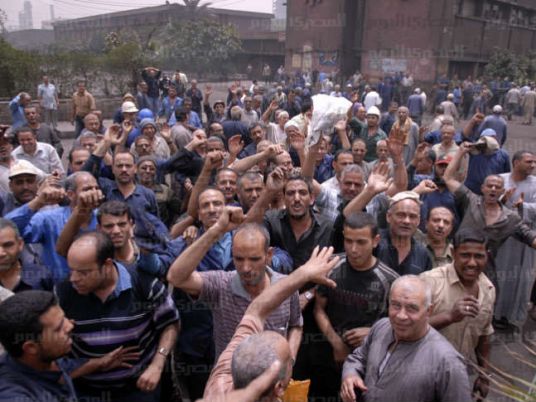
The “No Smoking” sign at the entrance of the Nasr Company for Cook and Chemicals makes you wonder if the toxic fumes inside are less dangerous than cigarette smoke.
Nobody expected the company, which began production in 1964, to make so many losses, caused by financial and administrative corruption.
Al-Masry Al-Youm spent five hours at the company, situated 20 kilometers from Helwan, and monitored the suffering of more than 2,000 workers. They wear torn gloves that are supposed to protect them from the heat, and primitive shoes with wooden soles, to help them step on the hot furnaces, in which coal is burnt at a temperature of 1,300 degrees Celsius. However, they do not wear masks to protect them from the fumes.
Many furnaces of the first and second unit are out of order, while the third unit has not worked for four years, given that its reparation would require hundreds of millions of pounds.
The first and second unit only work at 20 percent of their capacity, as the first production line operates 55 furnaces, the second one – 65 furnaces, and only one out of 54 furnaces is operational in the second unit.
Fathi, who works in the Maintenance Department, has been with the company for 30 years. He say it is impossible to supply coal for the Iron and Steel Company because the latter has not paid its dues, which in turn makes it difficult to import more coal.
According to Fathi. Iron and Steel Company used to obtain 2,000 tons from them, which accounts for 80 percent of the total production capacity. “We can no longer produce so much because many furnaces are out of order,” he says.
“We own 10 percent of the shares of the Helwan Fertilizer Company, which brings in 80 million pounds annually, enough to pay wages,” he said. “Now they want to make us a subsidiary of the Holding Company for Metallurgical Industries, which will greatly affect our income.”
“The officials are ignoring us,” he says. “and the profit share we used to receive during 20 years, was stopped.”
Mustafa, another worker, says the company used to buy batteries of a five-year lifespan for LE30 to 35 million, which the company used to make in six months. “Now, they get batteries with a lifespan up to 15 years, which are expensive to maintain and thus reduce profits.”
“The coal in Suez and Sinai is not good,” he says. “We import from America, Russia and Australia.”
A company engineer says the second battery was fixed for six million pounds to work for another year, but was used for two years. “It used to operate 46 furnaces, but now it only operates six,” he says.
As for the first battery, he says it was given to a Polish company for LE120 million in 2013. “They were not qualified for the job,” he says.
An official from the Accounting Department says that once the older employees retire, there are no trained cadres to replace them. “We only have temporary workers earning as little as LE30 per day,” he said. “And they face great risks, including fatal accidents.”
He points out that the company will incur unprecedented losses of up to LE150 million this year, because the president of the Holding Company for Metallurgical Industries, Zaki Bassiuny, reduced the price of a ton of coal by LE500, so as to decrease the losses of the Iron and Steel Company, which owes them hundreds of millions of pounds.
“An employee is not supposed to work for more than 10 years in operations, due to the dangerous work environment. After that, he should be assigned an administrative job,” he explains. “But many of them have worked for much longer and suffer from health problems.”
Another employee, Mustafa, says he had a stent placed in his arteries because of the toxic gases. “There is no oxygen tube at the clinic, can you imagine?” he says.
He says a German company was once assigned to maintain the furnaces but left in the middle of the project, because of the deficient industrial safety system. “The unfinished project cost us US$600,000,” he says.
Another worker says he was injured when an iron rod fell on his head. “They did not pay me anything because I have a temporary contract, not covered by insurance,” he says. “But when a Polish worker was injured in the leg, they immediately took him to a private hospital.”
Dr. Yousry al-Saeed explains that according to World Health Organization, excessive amounts of asbestos could cause heart problems. “We do not know whether asbestos is being used by the company,” says Ahmed Aboul Seoud, chairman of the Environmental Affairs Agency. “But we will check it.”
Mohamed Mekheimer, the new president of the company, says the batteries will be fixed to operate at full capacity again.
Edited translation from Al-Masry Al-Youm
